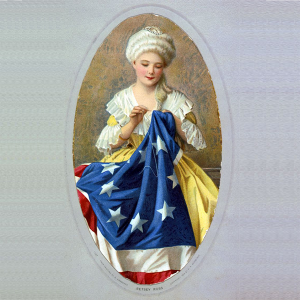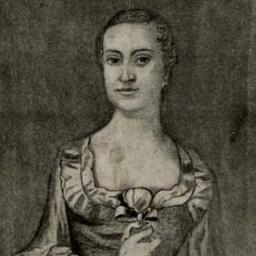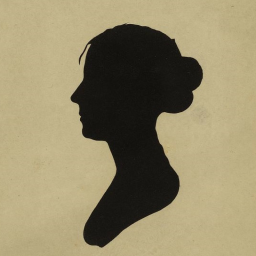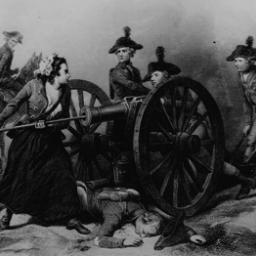Betsy Ross

Considered essential to the American Revolution, Betsy Ross is credited with sewing the first United States flag. A symbol of patriotism, Ross is often celebrated as the woman who helped George Washington finish the design. Although there is no historical evidence that she created this flag, her story has made her a national icon.
Betsy Ross was born as Elizabeth Griscom on January 1, 1752. She was the eighth of seventeen children, but only about nine survived childhood. Her father Samuel Griscom owned an old farmhouse and was a successful carpenter in New Jersey. When Ross was only three years old, her parents Samuel and Rebecca Griscom moved to Philadelphia, Pennsylvania. Ross and her family were members of the Quaker religion and she attended a traditional Quaker school in Pennsylvania. Upon finishing her schooling, Ross became an apprentice for the popular upholsterer, John Webster. Ross learned how to make and repair many items, including curtains, tablecloths, bedcovers, and rugs. She became a very skilled seamstress and upholsterer. While working for Webster, she fell in love with another apprentice named John Ross. John Ross was the son of the former Assistant Rector of Christ Church. The Quakers did not approve of their members marrying people outside of their faith, so Betsy’s family did not approve of her relationship with John Ross.
On November 4, 1773, Betsy and John ran to Hugg’s Tavern in Gloucester, New Jersey and eloped. Her decision to marry John Ross caused her to split from her family and the Quaker religion when she was only 21-years-old. Betsy and John Ross started their own upholstery business in Philadelphia and became members of Christ Church. Their business was successful, and it is reported that they even made bed hangings for George Washington in 1774. John Ross was also a member of the Pennsylvania militia. After three years of marriage, John Ross passed away. At 24-years-old, Betsy Ross became a widow. She continued to run the upholstery business and worked on uniforms, tents, and flags for the Continental Army.
Shortly after her first husband’s death, Ross claimed she was recruited for a very important job. According to a speech her grandson gave to the Historical Society of Pennsylvania years after her death, George Washington, Robert Morris, and George Ross, visited Ross’ upholstery shop in the summer of 1776. Washington and the two other members of the Continental Congress brought a rough sketch of a flag with thirteen red and white stripes and thirteen six-pointed stars. Ross suggested that the six-pointed stars be changed to five-pointed stars because they were easier to make. Allegedly, she showed them how to make the new stars by folding a piece of paper into triangles and with a “single snip of the scissors” she made a perfect star. The men agreed to change the design. Ross is said to have made the first American flag shortly after that meeting.
Ross continued working as a seamstress and upholsterer for many years. She married her second husband, Joseph Ashburn on June 15, 1777. They had two daughters, but their first daughter died at nine months old. Ashburn was a merchant sailor during the Revolution and a British warship captured his ship in 1781. He was sent to prison and he died in May of 1782 of an unknown illness. Later that year, a fellow prisoner named John Claypoole visited Ross to tell her that Ashburn passed away. Claypoole and Ross became friends and got married a year later. They enjoyed a 34-year marriage and had five children. Unfortunately, after years of poor health, Claypoole died in 1817. Ross continued to work in her shop until she retired at the age of 76. By 1833, she was completely blind, but she continued to tell the story of how she made the first American flag to her children and grandchildren. She died peacefully in her sleep on January 30, 1836, a few weeks after her 84th birthday.
In 1870, William Canby brought his grandmother’s story of making the first American flag to the public. He presented a paper to the Historical Society of Pennsylvania recalling the story his grandmother told him. No historical records or documentation could be found to verify his claims. Instead, Canby got family members to sign legal documents stating that Ross also told them this important story. His presentation brought Ross’ life into the spotlight and she became a national icon. Although historians now disagree with Canby’s evidence, Ross is often still credited with making the first American flag. On January 2, 1952, the Betsy Ross stamp was issued to celebrate the 200-year anniversary of her birth. It featured an image of Ross and the flag on her lap.
- Betsy Ross House. "History of Betsy Ross." Accessed January 10, 2019. http://historicphiladelphia.org/betsy-ross-house/woman/.
- Independence Hall Association. "Affidavit of Rachel Fletcher." Ushistory.org. Accessed January 10, 2019. http://www.ushistory.org/betsy/flagaffs.html.
- Independence Hall Association. "Betsy Ross and the American Flag." Ushistory.org. Accessed January 10, 2019. http://www.ushistory.org/betsy/flagtale.html.
- Miller, Marla R. Betsy Ross and the Making of America. New York: St. Martins Griffin, 2011.
- The National Postal Museum. "Betsy Ross." Accessed January 12, 2019. https://arago.si.edu/exhibit_262_7.html.
- Ulrich, Laurel Thatcher. "How Betsy Ross Became Famous." Common-place The Interactive Journal of Early American Life. October 2007. http://www.common-place-archives.org/vol-08/no-01/ulrich/.
Photograph:
- Library of Congress. Betsey sic Ross. , ca. 1908. Photograph. https://www.loc.gov/item/94507644/.
MLA - Alexander, Kerri Lee. "Betsy Ross." National Women's History Museum. National Women's History Museum, 2019. Date accessed.
Chicago - Alexander, Kerri Lee. "Betsy Ross." National Women's History Museum. 2019. www.womenshistory.org/education-resources/biographies/betsy-ross.
- Independence Hall Association. "Cut a 5-Pointed Star in One Snip." Accessed January 12, 2019. http://www.ushistory.org/betsy/flagstar.html.




